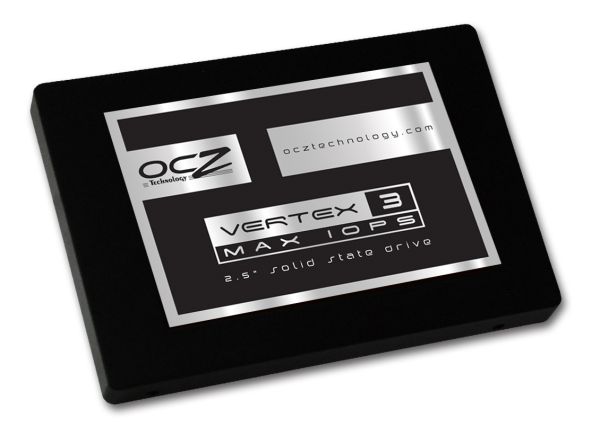This Just In: OCZ's Vertex 3 MAX IOPS 120GB, The New Mid-Range King?
by Anand Lal Shimpi on June 15, 2011 5:53 PM ESTI mentioned in our Mid-Range SSD Roundup that most SSD vendors like sampling the best balance of capacity/performance when it comes to SSD review samples. For the SandForce SF-2281 with 25nm NAND that just happens to be 240GB. Unfortunately there's a pretty big fall off in performance when going from 240GB to 120GB due to the decrease in total number of NAND die (8GB per die x 32 die vs. 16 die). I've explained this all before here.
Enter OCZ's MAX IOPS drive. Using 32nm Toshiba Toggle NAND instead of 25nm IMFT ONFI 2.x NAND the die capacity drops to 4GB, which means you get twice as many die per NAND device. The end result? 240GB Vertex 3 performance for slightly more than 120GB Vertex 3 pricing.
I ordered the 120GB MAX IOPS drive at the beginning of the week and just got it in yesterday so I've only had a small amount of time to test with it thus far. Check out the 120GB MAX IOPS drive vs. the Intel SSD 510 in Bench using our 2011 storage test suite. Expect the full review in the coming days.











107 Comments
View All Comments
geddarkstorm - Thursday, June 16, 2011 - link
Obviously that's true, for any piece of hardware, be it an SSD or an Intel SB motherboard.But this isn't an issue of reliability, the drives aren't physically breaking down, are they? Go peruse some HDD support forums and then compare reliability of SSDs to spinning platters.
This isn't a perform properly issue either, not for the physical device. It meets all its specs. The only case I've really heard of where a modern SSD did not perform properly was when the defective 25nm flash was leaking into OCZ's Vertex 2 drives.
Again, this isn't a reliability or performance issue of the physical drive. Something funky is happening with the OS/Bios and likely the power saving system. That's compatibility, but is it the SSD makers fault, or the fault of some bad OS update, bios/motherboard firmware? I guess we'll find out!
semo - Friday, June 17, 2011 - link
How is this not a reliability issue if the drive BSODs the system? Take Windows out of the argument because after the BSOD, the SF SSD is no longer detected. I wouldn't trust the 1% figure too much. I just don't see it as a credible figure.Keep in mind also, that OCZ censor their forums and delete some threads that highlight the issue.
chrnochime - Friday, June 17, 2011 - link
Just because they aren't physically broken doesn't mean they're reliable. That's like sayiing a bricked Router is reliable because all of its SMTs are still there and the flashchip that holds the firmware is still sitting on the board nice and soldered. It's not broken physically but then it doesn't do squat either.kensiko - Thursday, June 16, 2011 - link
I'm sure they were 100% their SSD was completely safe, but sure they did not test every hardware combination in the world. What would be the hardware combination ?100000000000000000000000000000000000
?
No, 100000000000000000000000000000000000000000000000000000000000000000
:P
L. - Friday, June 17, 2011 - link
And so, man invented scientific notation, and he saw that it was good.HaydenOscar - Thursday, June 16, 2011 - link
I'm looking to get an SSD (~120GB) in the near future, and was pretty sure I was going to get an SSD 510. Vertex 3 may be faster in most cases, but the loss of performance made me feel like Intel's offer was better as it offered steady performance regardless of compressibility. However, the performance of this drive is just a bit too much for me to ignore.My question to you people is: is my uneasiness unfounded?
kensiko - Thursday, June 16, 2011 - link
If you can get it at a good price than great, but don't forget this is a Marvell controller.In my situation Intel drives were rarely competitive (Canada). I got 2 X25-V when they were but now they are beaten by the others.
HaydenOscar - Thursday, June 16, 2011 - link
I'm in Australia: standard edition Vertex 3 120GB is $299. Max IOPS edition is $329. SSD 510 is $369.e-drood - Thursday, June 16, 2011 - link
OCZ, Corsair, OWC, Kingston and others only resell ssd's based on Sandforce Series 2000 controllers - said ssd's are manufactured by small number of specialist odm's...None of the Resellers are Qualified To Determine Solution Of Problem(s) Being Experienced By SSD Purchasers/Users...
And Sandforce is economically motivated NOT TO RECALL Series 2000 Controllers...
HaydenOscar - Thursday, June 16, 2011 - link
I should clarify that it's not any of the "problems" experienced by users of these controllers I'm uneasy about, but rather that I don't want all my performance to be dependent on the compressibility of my data.